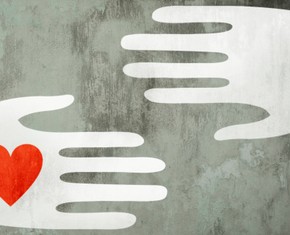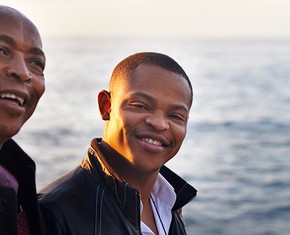The views expressed in our content reflect individual perspectives and do not represent the authoritative views of the Baha'i Faith.
Last week at Lake Tahoe, near where I live, a young man made a split-second decision to bravely jump into the lake from his boat to save two people in the water. They survived, but he didn’t.
Called the world’s most beautiful alpine lake, Tahoe can also be deadly. If you’ve ever visited, you might’ve admired its gorgeous mountain setting in the Sierras, or gazed down into its famously clear, frigid water, or even pondered its legendary breadth and depth. Thirty-five miles long and twenty wide, and more than 1600 feet deep, it can seem like an ocean rather than a freshwater lake.
Like an ocean, though, weather can quickly turn Lake Tahoe from calm to turbulent. Violent windstorms often descend on the lake as they cross the high mountains, and roil the normally placid waters into choppy, treacherous waves. But even when Lake Tahoe seems calm, it kills swimmers. The snowmelt-fed lake is so cold that unprotected immersion in it for even a few minutes can cause hypothermia and death.
Apparently, that exact thing happened last week. Many boaters and skiers had gone out on a beautiful sunny summer day to enjoy the lake. Two people fell off an inner tube being towed by a boat. A 27-year-old young man in that boat saw them fall into the cold water, and dove off his boat to save them.
But the two people who fell off made it back to their float tube and clung to it. Their potential savior, named Sayen Sengupta, never made it back to his boat. His noble, selfless act, trying to save two people, resulted in his death.
When he woke up that morning, I suspect that he never expected to leave this material world before nightfall. We all make that assumption in some way, though, because it helps us get through each day. We think we’re immortal, or we at least put off thinking about death, or push the thought out of our minds when it comes.
None of us know when we will leave this physical world and ascend to the spiritual one that awaits us all. We only know, without any doubt whatsoever, that we will one day flee this mortal realm. We could live long lives or short ones, depending on random circumstances as fickle as the weather or another driver or the temperature of a lake or a sudden outbreak of violence or some completely unsuspected illness or a thousand other complete unknowns.
The Baha’i teachings repeatedly bring this inescapable fact to our attention:
O peoples of the earth! … Perchance ye may not be consumed by the fire of self and passion, nor allow the vain and worthless objects of this nether world to withhold you from Him Who is the Eternal Truth. Glory and abasement, riches and poverty, tranquillity and tribulation, all will pass away, and all the peoples of the earth will erelong be laid to rest in their tombs. It behoveth therefore every man of insight to fix his gaze upon the goal of eternity, that perchance by the grace of Him Who is the Ancient King he may attain unto the immortal Kingdom and abide beneath the shade of the Tree of His Revelation.
Though this world be fraught with deception and deceit, yet it continually warneth all men of their impending extinction. The death of the father proclaimeth to the son that he, too, shall pass away. Would that the inhabitants of the world who have amassed riches for themselves and have strayed far from the True One might know who will eventually lay hand on their treasures; but … no one knoweth this save God, exalted be His glory. – Baha’u’llah, The Summons of the Lord of Hosts, pp. 169-170.
Every one of us human beings gets one life and one death – and we have no earthly idea when that death will come. Philosophers call this phenomena “existential dread” – the fear that we will cease to exist at the moment of death, and that therefore life essentially has no meaning.
The Baha’i teachings reassure us that our spiritual life will continue when the body dies. If we fix our “gaze on the goal of eternity,” we can attain it:
O Son of Man! Thou art My dominion and My dominion perisheth not; wherefore fearest thou thy perishing? Thou art My light and My light shall never be extinguished; why dost thou dread extinction? Thou art My glory and My glory fadeth not; thou art My robe and My robe shall never be outworn. Abide then in thy love for Me, that thou mayest find Me in the realm of glory. – Baha’u’llah, The Hidden Words, p. 7.
From a Baha’i perspective, then, the meaning of life emerges directly from its eternal nature:
… death is only a relative term implying change. For example, we will say that this light before me, having reappeared in another incandescent lamp, has died in the one and lives in the other. This is not death in reality. The perfections of the mineral are translated into the vegetable and from thence into the animal, the virtue always attaining a superlative degree in the upward change. In each kingdom we find the same virtues manifesting themselves more fully, proving that the reality has been transferred from a lower to a higher form and kingdom of being. Therefore, nonexistence is only relative and absolute nonexistence inconceivable. This rose in my hand will become disintegrated and its symmetry destroyed, but the elements of its composition remain changeless; nothing affects their elemental integrity. They cannot become nonexistent; they are simply transferred from one state to another.
Through his ignorance man fears death, but the death he shrinks from is imaginary and absolutely unreal; it is only human imagination.
The bestowal and grace of God have quickened the realm of existence with life and being. For existence there is neither change nor transformation; existence is ever existence; it can never be translated into nonexistence. – Abdu’l-Baha, The Promulgation of Universal Peace, pp. 88-89.
None of us knows our fate. We can only prepare now for an eternal existence later, with the absolute conviction that the moment of transition will come to each of us, whether eventually or immediately.
You May Also Like
Comments

















— Padmasambhava (The Tibetan Book of the Dead)
Baha'u'llah: Gleanings, Page: 171